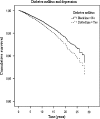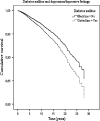Diabetes mellitus type II as a risk factor for depression: a lower than expected risk in a general practice setting - PubMed (original) (raw)
Diabetes mellitus type II as a risk factor for depression: a lower than expected risk in a general practice setting
S Aarts et al. Eur J Epidemiol. 2009.
Abstract
The aim of the present study was to determine whether a diagnosis of diabetes mellitus (DM) in a primary setting is associated with an increased risk of subsequent depression. A retrospective cohort design was used based on the Registration Network Family Practice (RNH) database. Patients diagnosed with diabetes mellitus at or after the age of 40 and who were diagnosed between 01-01-1980 and 01-01-2007 (N = 6,140), were compared with age-matched controls from a reference group (N = 18,416) without a history of diabetes. Both groups were followed for an emerging first diagnosis of depression (and/or depressive feelings) until January 1, 2008. 2.0% of the people diagnosed with diabetes mellitus developed a depressive disorder, compared to 1.6% of the reference group. After statistical correction for confounding factors diabetes mellitus was associated with an increased risk of developing subsequent depression (HR 1.26; 95% CI: 1.12-1.42) and/or depressive feelings (HR 1.33; 95% CI: 1.18-1.46). After statistical adjustment practice identification code, age and depression preceding diabetes, were significantly related to a diagnosis of depression. Patients with diabetes mellitus are more likely to develop subsequent depression than persons without a history of diabetes. Results from this large longitudinal study based on a general practice population indicate that this association is weaker than previously found in cross-sectional research using self-report surveys. Several explanations for this dissimilarity are discussed
Figures
Fig. 1
Survival curve corrected for age, practice identification code and a diagnosis of depression preceding DM
Fig. 2
Survival curve corrected for age, practice identification code and a diagnosis of depression preceding DM
Similar articles
- Is depression related to subsequent diabetes mellitus?
van den Akker M, Schuurman A, Metsemakers J, Buntinx F. van den Akker M, et al. Acta Psychiatr Scand. 2004 Sep;110(3):178-83. doi: 10.1111/j.1600-0447.2004.00333.x. Acta Psychiatr Scand. 2004. PMID: 15283737 - [Depressive disorders in diabetic patients].
Manoudi F, Chagh R, Benhima I, Asri F, Diouri A, Tazi I. Manoudi F, et al. Encephale. 2012 Oct;38(5):404-10. doi: 10.1016/j.encep.2012.01.010. Epub 2012 May 28. Encephale. 2012. PMID: 23062454 French. - Depression and Risk for Diabetes: A Meta-Analysis.
Yu M, Zhang X, Lu F, Fang L. Yu M, et al. Can J Diabetes. 2015 Aug;39(4):266-72. doi: 10.1016/j.jcjd.2014.11.006. Epub 2015 Mar 13. Can J Diabetes. 2015. PMID: 25773933 Review. - Are adults diagnosed with type 2 diabetes at a greater risk of developing depression? Integrative literature review.
Coley R, Alnababtah K. Coley R, et al. Br J Nurs. 2022 Mar 10;31(5):266-273. doi: 10.12968/bjon.2022.31.5.266. Br J Nurs. 2022. PMID: 35271363 Review.
Cited by
- Risk of Depression and Suicidality among Diabetic Patients: A Systematic Review and Meta-Analysis.
Elamoshy R, Bird Y, Thorpe L, Moraros J. Elamoshy R, et al. J Clin Med. 2018 Nov 16;7(11):445. doi: 10.3390/jcm7110445. J Clin Med. 2018. PMID: 30453557 Free PMC article. Review. - Improvements in Depression Outcomes Following a Digital Cognitive Behavioral Therapy Intervention in a Polychronic Population: Retrospective Study.
Venkatesan A, Forster B, Rao P, Miller M, Scahill M. Venkatesan A, et al. JMIR Form Res. 2022 Jul 5;6(7):e38005. doi: 10.2196/38005. JMIR Form Res. 2022. PMID: 35788442 Free PMC article. - Diabetes increases the risk of depression: A systematic review, meta-analysis and estimates of population attributable fractions based on prospective studies.
Chireh B, Li M, D'Arcy C. Chireh B, et al. Prev Med Rep. 2019 Feb 10;14:100822. doi: 10.1016/j.pmedr.2019.100822. eCollection 2019 Jun. Prev Med Rep. 2019. PMID: 30815337 Free PMC article. Review. - Metabolic Profile and Long-Term Risk of Depression, Anxiety, and Stress-Related Disorders.
Chourpiliadis C, Zeng Y, Lovik A, Wei D, Valdimarsdóttir U, Song H, Hammar N, Fang F. Chourpiliadis C, et al. JAMA Netw Open. 2024 Apr 1;7(4):e244525. doi: 10.1001/jamanetworkopen.2024.4525. JAMA Netw Open. 2024. PMID: 38564219 Free PMC article. - Health literacy and depression in women with type 2 diabetes mellitus.
Hsu YL, Su DH, Kuo SC. Hsu YL, et al. Clinics (Sao Paulo). 2020;75:e1436. doi: 10.6061/clinics/2020/e1436. Epub 2020 May 29. Clinics (Sao Paulo). 2020. PMID: 32490935 Free PMC article.
References
MeSH terms
LinkOut - more resources
Full Text Sources
Medical
Miscellaneous

